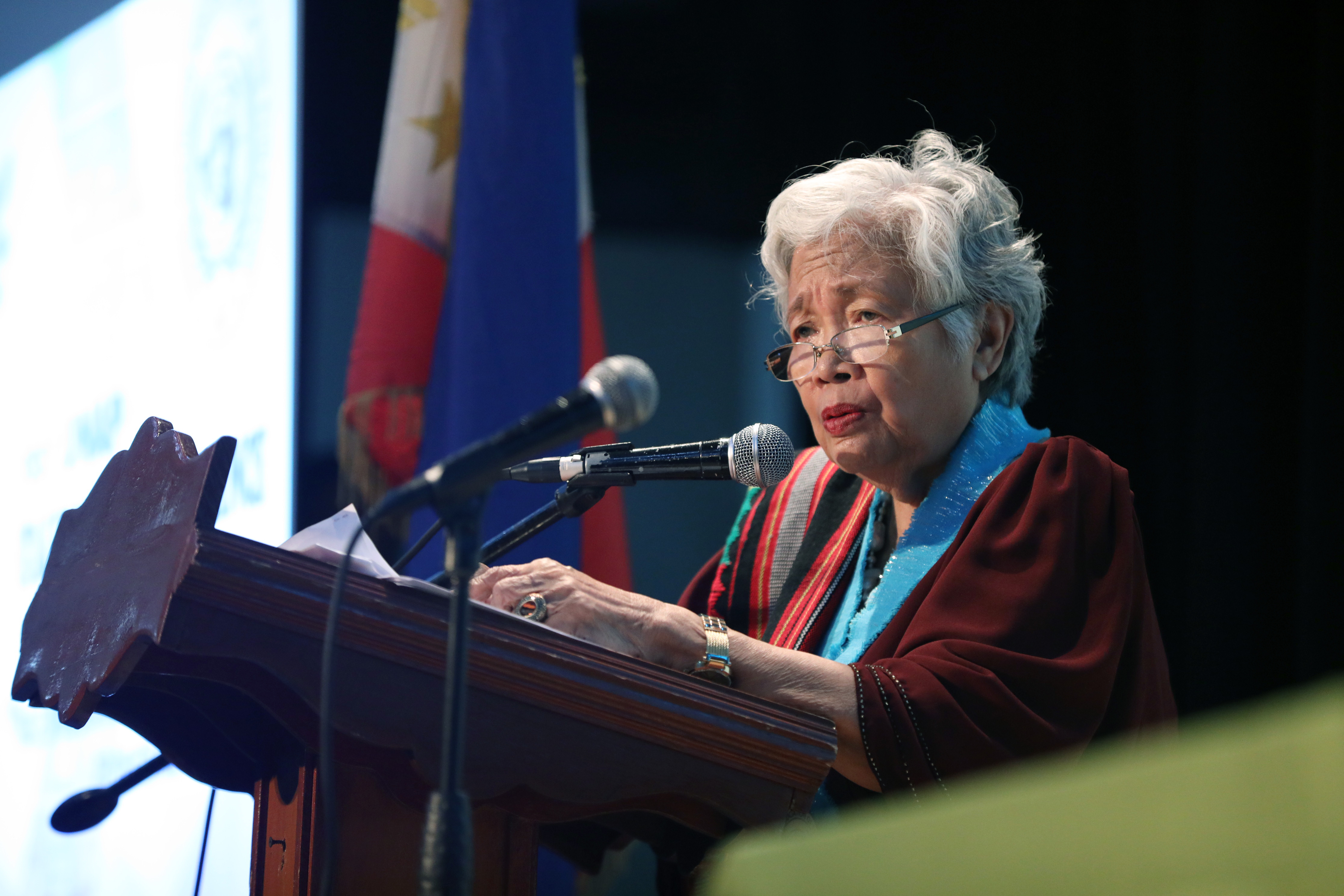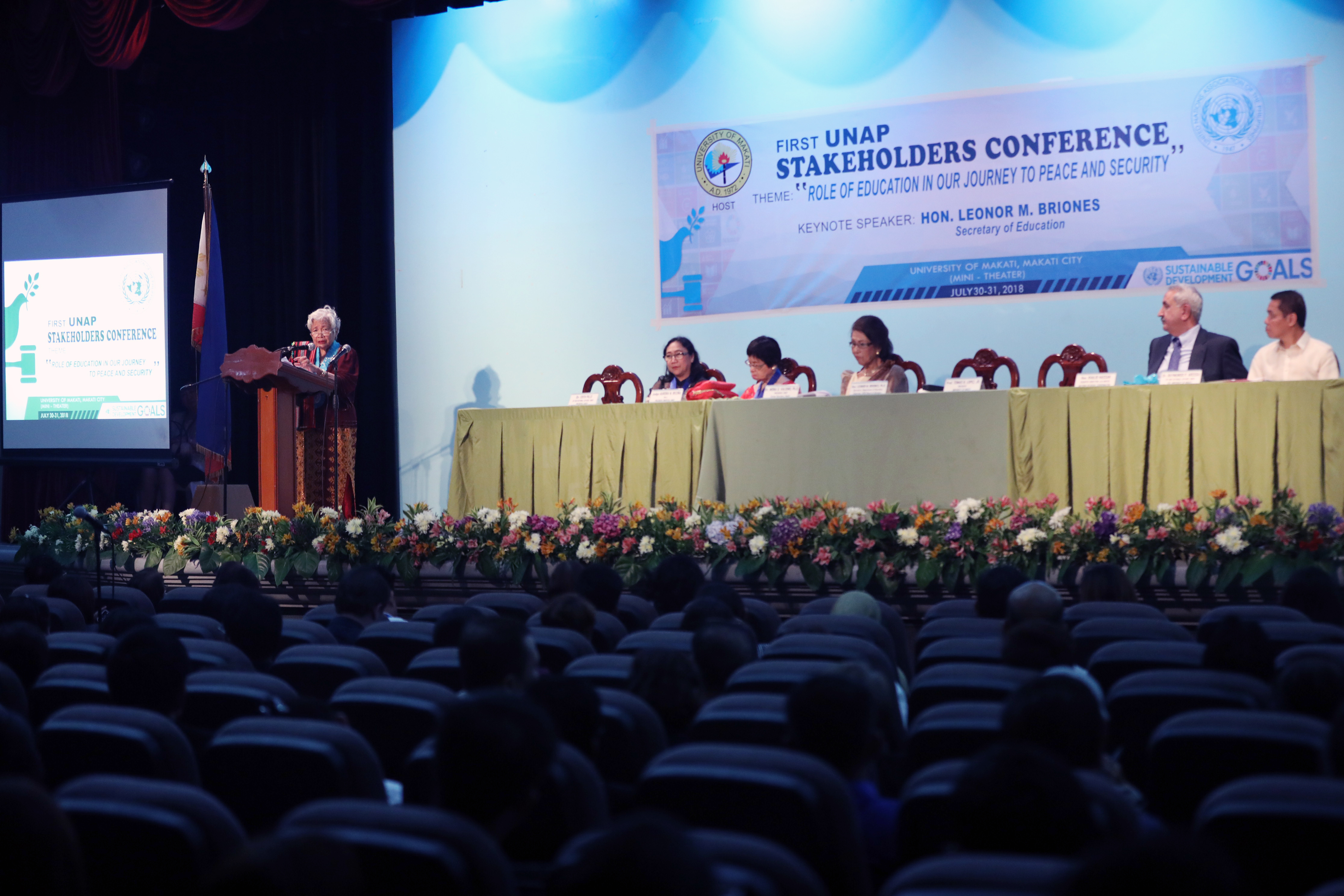MAKATI CITY, August 30, 2018 – Department of Education (DepEd) Secretary Leonor Magtolis Briones highlighted the Department’s effort in strengthening the K to 12 curriculum, with focus on peace and global citizenship education, during the First United Nations Association of the Philippines (UNAP) Stakeholders Conference held on July 30 to 31 at the University of Makati.
The conference carried the theme, “The Role of Education in Our Journey to Peace and Security,” and was attended by peace advocates, education leaders, youths, and other stakeholders from various government agencies, non-government organizations (NGOs), educational institutions, and international organizations.
In her keynote address, the Education chief noted that one cannot have quality education if there is no peace and security, and shared what the Department is contributing in this aspect.
“Topics on peace and security are already integrated in our curriculum, but we, in DepEd, continuously conduct efforts to uplift our education system, and revisiting and further improving our curriculum is a part of it… If there is peace and security in the largest unit of government, in the biggest office with the largest number of people, the largest number of learners, then perhaps a major contribution can be made. And we thank the UN agencies for their continuing support. We thank the UNAP for their interest. You are in education and you know what it means, how precious education is to all of us,” Briones stated.
She explained that DepEd is in constant talks with education stakeholders to strengthen the K to 12 curriculum: “We have been getting feedbacks from industry, parents, schools heads, teachers, and other stakeholders, especially on how our curriculum treats issues of peace and security.”
The Secretary added that these issues are becoming more urgent not only in the Philippines, but also in a global scale. Thus, ensuring ways in instilling lessons about achieving a more inclusive, just, and peaceful world in learners is vital.
Safe Schools Declaration
Briones also reiterated the Department’s strong commitment in maintaining the neutrality of schools as zones of peace to ensure that learners and teachers are in an environment conducive to learning and free from harm through the DepEd Order No. 44, series of 2005, or the Declaration of Schools as Zones of Peace
“DepEd has long been implementing the policy on safe schools; Schools that are established and registered with DepEd, whether public or private, are safe from any military visitors, activities, and we campaigned heavily for this during the Marawi siege,” she stated.
The Secretary likewise noted that DepEd, the Department of National Defense (DND), and other national government agencies fully support and are signatories of the Safe Schools Declaration (SSD).
The SSD, an international initiative, was crafted and developed through consultations among various states as “an inter-governmental political commitment that provides countries the opportunity to express support for protecting students, teachers, schools, and universities from attack during times of armed conflict; the importance of the continuation of education during armed conflict; and the implementation of concrete measures to deter the military use in schools.”
Learners’ safety in schools
Aside from ensuring that no armed conflict or personnel are allowed near and within the premises of a learning environment, the Education chief emphasized that the Department strongly implements policies that safeguard learners from incidences of bullying and physical violence.
“Bullying is absolutely forbidden and there is a protocol for handling cases of bullying; hazing is also forbidden, physical acts of violence, whether among the children, or as sometimes claimed from teachers, or from children to their teachers, these undesirable actions are all forbidden,” Briones remarked.
Global citizenship
Briones also noted that because of the rapid globalizing state of the society, advancing lessons in global citizenship is important in order to have platforms for meaningful exchange, where people can learn each other’s history, culture and circumstances to foster greater respect and tolerance for each other’s identity.
“Through partnerships, we are sending our teachers to visit other countries to get vital insights which we can use for the betterment of our educational system,” she said.
“Peace, security, and global citizenship are already in the curriculum but we are further strengthening it, especially in terms of instructional materials, ways of teaching, and even the use of films, dances, and other forms of art in order to transmit these ideas and concepts to our learners,” Briones expounded.
Also present at the event were Presidential Peace Adviser Secretary Jesus Dureza, Commission on Higher Education (CHED) Commissioner Ronald Adamat, UNAP President and former DepEd Secretary Mona Valisno, UNAP President Emeritus Aurora Reciña, and former Senator Anna Dominique Coseteng.
Established in 1947, UNAP aims to help promote global understanding, cooperation and peace in the Philippines and among nations based on human dignity and universal service.
END




